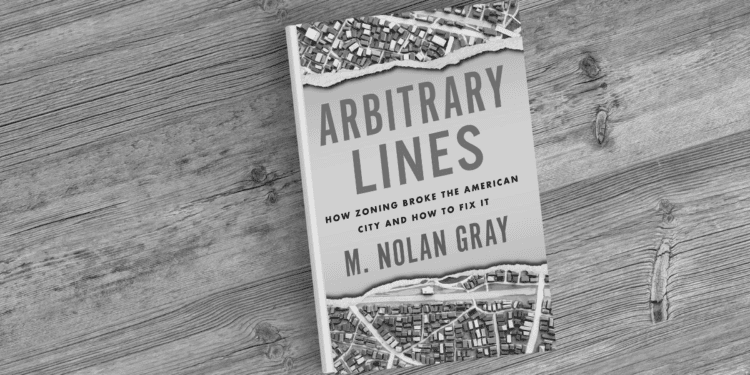I wish I had the means to provide copies of Nolan Gray’s book, “Arbitrary Lines” to every local policymaker in the United States. While Gray’s background in city planning and subsequent policy research is evident in his command of the history and intricacies of zoning policy, the book does not require any familiarity with either on behalf of readers. Gray’s prose is clear and approachable—yet Gray himself does not pull any punches in his indictments of zoning.
From the very beginning, Gray lets you know where he stands. On page 4 he writes, “zoning is perhaps the most successful segregation mechanism ever devised.” He details the history of zoning policy from the early 1900s when it was explicitly racist in cities like Baltimore and Louisville through the 1920s and 30s where—once explicit racial segregation was found to be unconstitutional—economic segregation was used to legally accomplish the same ends.
Expounding on that point, Gray writes, “zoning is a mechanism of exclusion designed to inflate property values, slow the pace of new development, segregate cities by race and class, and enshrine the single-family house and the exclusive urban ideal” (p30). He details the ways in which this was done, through blocking new housing, mandating that new construction be of a particular quality or lot size, and through a burdensome and unpredictable process of municipal permitting and public approval. As a result, as the population increased housing production failed to keep up. Who can be surprised that there is an affordability crisis?
Gray does write a single sentence with which I cannot agree: “The extreme fragmentation of local governance in the United States makes a simple city-by-city approach to zoning reform a nonstarter” (p131). Obviously, we at Better Cities Project are committed to helping city leaders find ways to improve the lives of their communities. However, we appreciate the difficulty of the matter at hand. Anyone working in city hall can appreciate it: from the larger developers who use expensive regulation to keep smaller competition at bay, to those in position to authority who are incentivized to use their position in city government to hand out (and deny!) favors, to those few permanent fixtures at community meetings who use the process to protect their own property values at the expense of nearly everyone else. The good news is that local activists have begun to demand changes in their cities—and have lobbied state legislatures to protect those changes.
Let me add here that in no way should Gray be understood to be hostile to cities. Time and again Gray indicates his love for cities, their usefulness as job markets and creators of wealth and innovation. Gray mourns for what we have lost by denying the freedom of cities to shape and reshape themselves over time. If anything, “Arbitrary Lines” is a paean to what Harvard Economist Ed Glaeser called “man’s greatest invention” and a prayer that we return to it.
Certainly, Gray advocates for the complete end to zoning altogether. Before doing so, however, he makes it clear that zoning is often not what we think it to be. It is not the thing that monitors nuisances such as noise or light pollution or protects air and water quality. And he holds up Houston, Texas as an example of how a city without zoning can work to be mindful of neighborhood concerns while at the same time not suffering the same national increase in housing prices and cost of living. In fact, it is Houston’s ability to easily address housing needs that has it’s housing costs so much lower than the national average despite being the 4th populous city in the country.
But even if zoning were to remain, there is much cites can do. Gray advocates relaxing regulations that require that ONLY single-family detached housing be built—as is the case with about 75 percent of the land in US cities. Even where single family housing is to remain, cities could eliminate or lower minimum lot sizes and floor area, or reduce restrictions on ADUs—accessory dwelling units—that allow homeowners to build onto existing structures or add more units into them.
Regardless of how we got here, the US is in a housing crunch. This won’t surprise BCP readers, 85 percent of whom indicated in a recent survey that housing affordability is “very much an issue” in your city. Furthermore, over a third (35 percent) indicated that the issue was a failure of public policy. “Arbitrary Lines” details the history of those public policy failings and lays the blame largely at zoning. Certainly we at BCP appreciate the enormous undertaking that such reform would require—but you owe it to yourselves to take a look at Gray’s book. I am confident that you too will want everyone else to read it too. It may not make the solutions any easier—but it will help everyone understand the problem we face.









